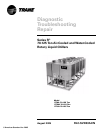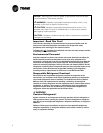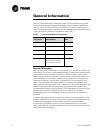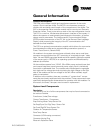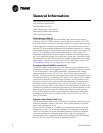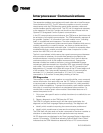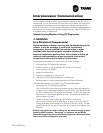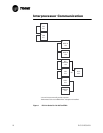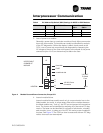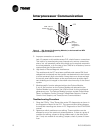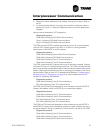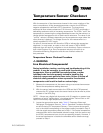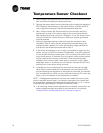
8 RLC-SVD03A-EN
Interprocessor Communications
The respective modules communicate with each other via an InterProcessor
Communication link (IPC). The IPC allows the modules to work in a coordi-
nated manner with the CPM directing overall chiller operation while each
module handles specific subfunctions. This IPC link is integral and necessary
to the operation of the Unit Controls and should not be confused with the
Optional ICS (Integrated Comfort System) communication.
In the IPC communication protocol scheme, the CPM acts as the initiator and
the arbitrator of all module communication. The CPM essentially requests all
the possible “packets” of information from each module in turn, (including
itself), in a predefined serial sequence. The other modules act as
“responders” only and cannot initiate communication. Modules which are not
currently responding to a specific request, can listen to the data and thus,
indirectly, they communicate with each other. It is helpful to remember when
troubleshooting that a module must be able to hear a request for its infor-
mation from the CPM, or it will not talk.
The link is non-isolated, which means that a good common ground between
all the modules is necessary for trouble-free operation (provided by the
module enclosures' mounting using star washers). Also, the link requires
consistent polarity on all of the module interconnections. Connections
between modules are made at the factory, using unshielded #18 gauge
twisted pair cable terminated into a 4-position MTA type connector (orange
color code). This connector is plugged onto the 4 pin IPC connection jack
designated as J1, located in the upper left corner of the PC board edge on all
of the modules. The 4 pins actually represent 2 pairs of communications
terminals (J1-1 (+) internally connected to J1-3, and J1-2 (-) internally
connected to J1-4) to allow for easy daisy chaining of the bus.
IPC Diagnostics
The modules, in order to work together to control the chiller, must constantly
receive information from each other over the IPC. Failure of certain modules
to communicate or degradation of the communication link, could potentially
result in chiller misoperation. To prevent this situation, each module monitors
how often it is receiving information from designated other modules. If a
module fails to receive certain other module's transmitted data over a 15
second time period it will:
1. On its own, take specific action to safely shut-down (or to default) its con-
trolled loads.
2. Report a diagnostic to the CPM (over the IPC link).
The CPM (if it properly receives such) will then report and display the
diagnostic on the Clear Language Display accordingly. The diagnostic will:
• identify which module is reporting the communication problem and
• identify which module was to have sent the missing information.
The CPM itself will then send out further commands to the other modules to
shutdown or take default actions as the particular case may warrant.
All IPC diagnostics are displayed in the Clear Language Display's diagnostics
section. For example, “Chiller Mod indicating Options Mod Comm Failure”
indicates that the CPM Module has detected a loss of IPC communication



